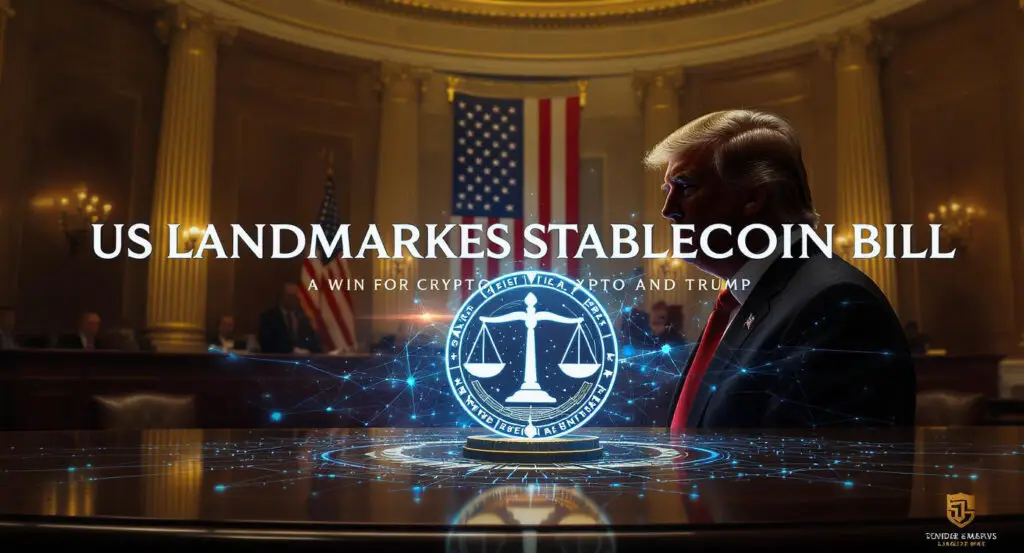The United States Senate has officially passed a landmark bill aimed at creating a comprehensive regulatory framework for US-dollar-pegged cryptocurrency tokens, commonly known as stablecoins. This pivotal vote, which took place on Tuesday with a decisive 68-30 margin, signifies a watershed moment for the ascendant digital asset industry and a significant win for President Donald Trump, who has actively championed crypto-friendly policies. The bipartisan support for the bill, dubbed the GENIUS Act, reflects a rare instance of consensus in the deeply divided Senate, despite lingering concerns from some Democrats regarding potential conflicts of interest related to Trump’s personal crypto ventures.
GENIUS Act Forges Stablecoin Rules
The GENIUS Act, if signed into law, will establish, for the first time, a clear regulatory regime for stablecoins. This fast-rising financial product, designed to maintain a constant value typically pegged 1:1 to the US dollar, is widely used by crypto traders for efficient fund movement between various tokens. Proponents argue that the legislation will unlock stablecoins’ potential to facilitate instant payments, revolutionizing transaction processing by offering a cheaper and faster alternative to traditional banking products like credit cards and checks.
Bipartisan Support Drives Progress
The passage of the GENIUS Act by a significant bipartisan margin of 68-30 demonstrates a broad consensus in the Senate regarding the need for stablecoin regulation. This support included several Democrats who joined the majority of Republicans in backing the proposed federal rules. The vote marks a considerable achievement for the crypto industry, which has invested heavily in lobbying efforts and backed pro-crypto congressional candidates in recent election cycles, aiming to paint the issue as a bipartisan priority.
Stringent Reserve and Disclosure Requirements
A key provision of the stablecoin bill mandates that dollar-pegged tokens must be fully backed by highly liquid assets. These reserves would primarily consist of US dollars and short-term Treasury bills. Furthermore, the legislation requires issuers to publicly disclose the precise composition of their reserves on a monthly basis, ensuring transparency and accountability. This measure aims to protect consumers and enhance the stability of stablecoins by ensuring they are adequately collateralized, a direct response to past market volatility and concerns about opaque reserves.
Industry Hopes for Mainstream Adoption
Industry backers are optimistic that this legislation will serve as a catalyst, transforming stablecoins into a mainstream form of payment. Retailers, for example, have expressed strong interest in the bill, foreseeing stablecoins as a more cost-effective and swift method for processing transactions compared to conventional banking systems. This potential for widespread adoption across various sectors underscores the significant economic implications of the GENIUS Act, promising a more efficient and integrated financial ecosystem.
Banks React to Stablecoin Evolution
The banking sector has shown a mixed reaction to the stablecoin bill. Smaller banks have voiced concerns about a potential drain on traditional deposits and a subsequent reduction in access to credit, fearing that stablecoins could divert funds away from conventional banking channels. Conversely, larger banks are actively exploring the possibility of issuing their own stablecoins, recognizing the lucrative potential to generate profits from interest earned on the reserves backing these digital assets. This divergent response highlights the competitive dynamics stablecoins introduce into the financial landscape.
Tech Giants Poised to Enter Finance
Beyond traditional financial institutions, the GENIUS Act, if enacted, could open the door for technology companies and other large non-financial businesses to issue their own stablecoins. This possibility represents a significant disruption to the longstanding separation of finance and commerce in the United States. Such a shift could fundamentally reshape the financial services industry, leading to new forms of competition and innovation as major tech players leverage their vast user bases and technological capabilities to enter the payments and financial services arena.
Concerns Over Conflicts of Interest and Consumer Protection
Despite its bipartisan passage, the bill has faced criticism, particularly from Democrats led by Senator Elizabeth Warren. Opponents argue that the legislation does not adequately prevent President Trump from potentially profiting from his many crypto ventures while in office, with a Trump-affiliated stablecoin already boasting a $2 billion market value. Warren stated the bill could “supercharge the value of Donald Trump’s corruption,” expressing deep concerns about consumer protection, financial stability, and national security risks if issuers fail, especially as stablecoins would not be protected by federal deposit insurance.
Next Steps: House Review and Potential Changes
With the bill now passed by the Senate, its fate rests with the House of Representatives. The House has been pursuing its own crypto legislation, including a more sweeping measure to regulate the broader crypto market. House lawmakers must now decide whether to directly take up the Senate bill or engage in negotiations to create a compromise measure. Senator Thom Tillis, a senior Republican on the Banking Committee, has warned the House against amending the Senate’s bill, predicting that any changes would lead to its “dead on arrival” status in the Senate, potentially stalling crypto legislation until the fall if not passed swiftly.























